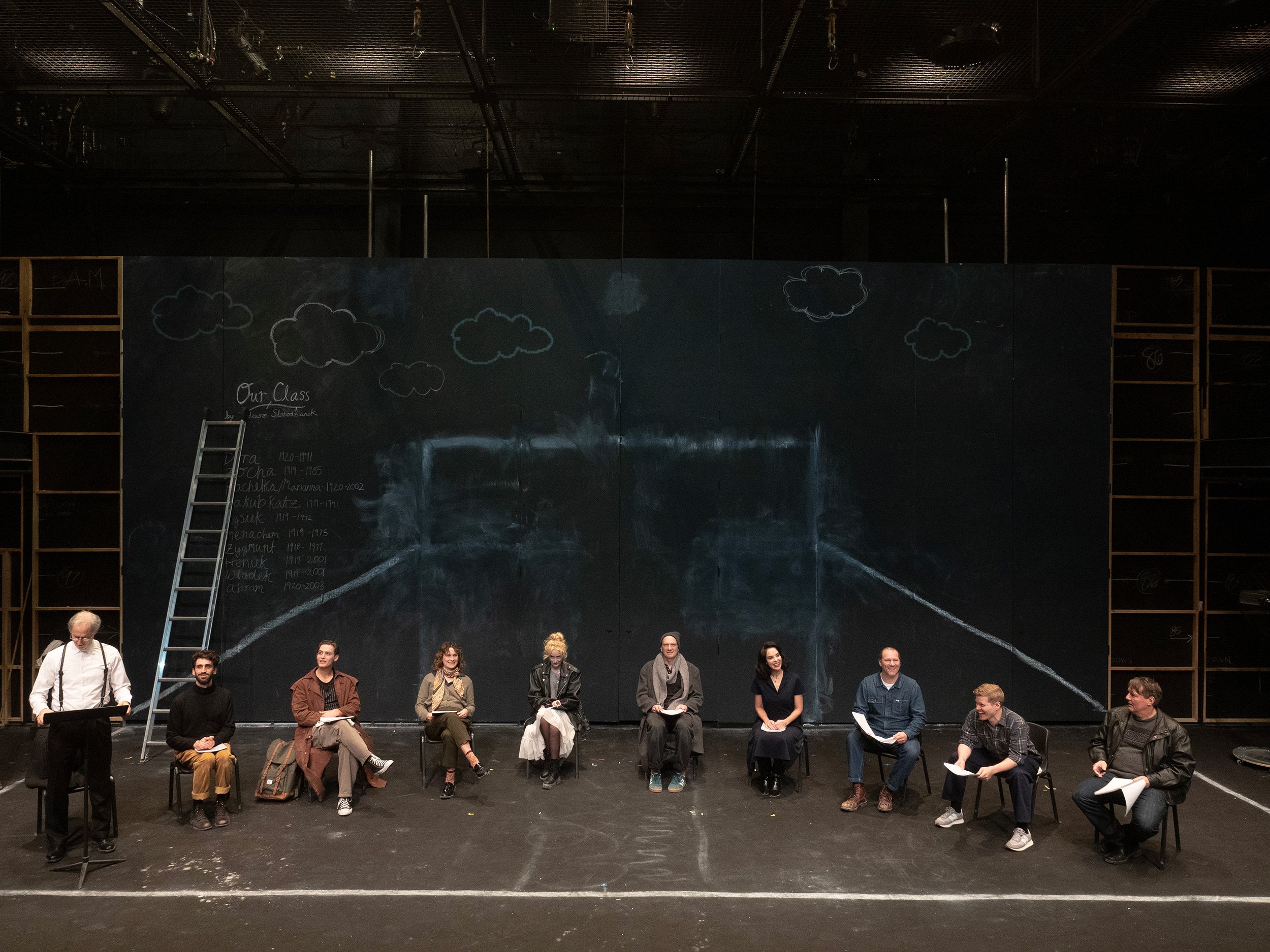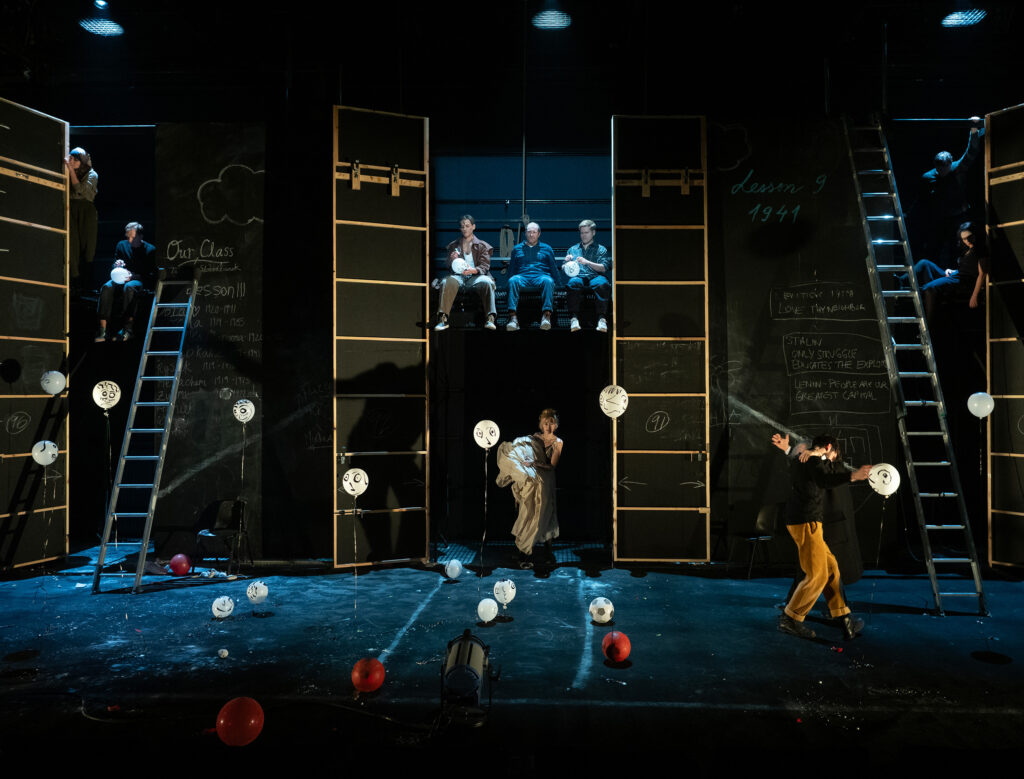
January 17, 2024.

(New York Jewish Week) —“But what could I do?”
Variations of this question are asked again and again throughout Polish playwright Tadeusz Słobodzianek’s “Our Class.” The play is inspired by the real-life 1941 pogrom in the small Polish village of Jedwabne, in which local residents murdered hundreds of their Jewish neighbors.
And now, at a time of increasing antisemitism stemming from Israel’s war with Hamas, “Our Class” makes its New York premiere at Brooklyn Academy of Music’s Fisher Fishman Space.
“Our Class,” first produced in 2009, tracks 10 Jedwabne residents — half of them Jewish and half Catholic, with the majority of the characters based on real people — from 1925 through the pogrom and beyond. The characters begin as young classmates, children of 5 and 6 playing and learning together and dreaming of their futures. In this context, “But what could I do?” refers to harmless events, such as one student silently standing by while another is teased for his unrequited crush. As they reach young adulthood, the classmates are haplessly thrust into the roles of victim and perpetrator, and “But what could I do?” takes on a terrifying gravity.
That the murderers in “Our Class” were conducted by Jews’ neighbors, rather than occupying German Nazis, is what made director Igor Golyak so eager to tackle Słobodzianek’s text.
“It was just regular people, just like you and I, that could reach these heights of hate and find a reason to burn their neighbors,” Golyak, a Ukrainian Jew who immigrated to the United States at the age of 11, told the New York Jewish Week.
Based in the Boston area, Golyak is the founder and artistic director of Arlekin Players Theater, a company made up of Jewish immigrants and refugees from Eastern Europe dedicated to presenting Russian theater. He’s gained acclaim in recent years for his virtual theater work, including “State vs. Natasha Banina,” which was a New York Times Critics Pick, and “chekhovOS/an experimental game/,” starring Mikhail Baryshnikov and Jessica Hecht.
When Golyak and his creative team first read “Our Class” together in May 2023, they drew comparisons to the ongoing war in Ukraine. What they couldn’t have expected was how Hamas’ Oct. 7 terrorist attack on Israel, and its aftermath that has included both a war in Gaza and global displays of antisemitism, have recast Słobodzianek’s play in a new light.
“It feels very urgent, like it’s another recognition of the importance of not forgetting the antisemitism and hate that unfortunately exists in the world,” Golyak said. “We think this lies asleep in the world culture. But it is a very light sleeper.”
The Jedwabne pogrom was thrust into the spotlight in 2001 with the publication of Jan T. Gross’ book “Neighbors.” Gross, a professor of history at Princeton University, discovered that despite public perception — and even a memorial in Jedwabne — the massacre of the village’s 1,600 Jews did not happen by the hands of the Nazis. Rather, it was the local Catholic Polish population who took the initiative in torturing, murdering and burning alive their neighbors. Gross’ revelation led Poland’s president, Aleksander Kwasniewski to apologize to the international Jewish community in 2001, though some Poles remained in denial. A decade later, on the 70th anniversary of the massacre, Polish President Bronislaw Komorowski asked for forgiveness again.
More recently, however, the Polish government has adopted an official stance of denial, vigorously rejecting any claims of local complicity in the Nazi campaign against the Jews, which left 90% of Polish Jews dead.
Alexandra Silber, a Jewish actress with a ream of Broadway and West End credits who’s playing the part of Jewish classmate Rachelka, has also felt the tenor of the play shift since the events of Oct 7. “It’s made it horrifying and relevant in a new way,” she said. “I felt really called upon by Rachelka to serve her. I have a lot to say on her behalf.”
Rachelka is one of a handful of Jewish characters in “Our Class” who aren’t killed in the pogrom. One of her Polish classmates hides her away and eventually marries her. She converts to Catholicism and changes her name. Like with each of the 10 classmates, Rachelka’s journey raises its own questions.
“Is it better to survive?” reflects Silber. “Rachelka’s Jewishness, her Jewish name, her Jewish soul departs, and she has to live as a new person. Every single thing about her survivor’s life does not resemble who she began as, and is that better?”
Alongside Silber, the cast is made up of actors hailing from New York, Los Angeles, Ukraine and Russia, and includes both Jewish artists and some with Polish roots. “We’ve really created an unbelievable diversity of humanity in our group of 10,” Silber said.
Golyak adds that after the Oct. 7 attack, the cast came together in a series of discussions. “We have cast members and team members, designers, that were personally affected by Oct. 7 because of relatives and friends that have actually been murdered,” he said. “So it’s been a very, very personal journey.”
While “Our Class” dives deeply into its challenging subject matter, it is not without its moments of levity.
“I’m trying to find a lot of humor in this play because people are funny, and that’s what makes them humans and humane,” Golyak said. “We can relate to people that make mistakes and are sometimes funny and sometimes awkward, and these people are just like us.”
New York audiences will have the chance to see themselves most clearly in the character of Abram, the only one of the 10 classmates who left for the United States before the 1941 pogrom. Throughout the play, Abram (played by “Indecent” star Richard Topol) communicates with his old friends through letters, trying to piece together the conflicting information he receives from the safety of his home in New York.
Abram serves as a foil, a reminder of the fallibility and subjectivity of memory. “We need to understand this as people living in America, separated by the ocean from evil,” Golyak said. “The more relatable Abram is, the more we understand that this evil is actually closer than we think.”
Technology has become a hallmark of Golyak’s work, and this production uses devices such as a fake documentary movie set — complete with an onstage camera person — along with chalk drawings and projections, to expose elements of the characters’ journeys. He’s joined by a creative team including scenic designer Jan Pappelbaum, music director Lisa Gutkin, choreographer Or Schraiber, and many more.
“Our Class” raises a lot of questions, but neither Słobodzianek nor Golyak are interested in offering simple answers. But for the director, that’s precisely the point.
“It’s very difficult to overcome these big events in one’s life, and I’m definitely not here to judge who did the right thing or the wrong thing, because I don’t know how I would act in these situations,” Golyak said. “But the beauty of this play is that it asks these questions.”
“Our Class” will be performed through Feb. 4 at BAM’s Fisher Fishman space (321 Ashland Pl., Brooklyn). Tickets start at $59.
